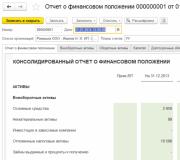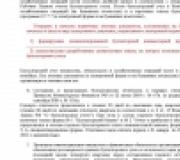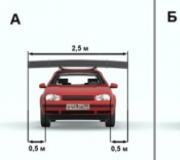The DPRK celebrates the “Day of the Sun.” The most grandiose holiday in the history of North Korea In the center of thinking and activity
Text: Oleg Kiryanov
Today in the DPRK they celebrate one of the most important public holidays - the birthday of the founder and only president of the country, Kim Il Sung. In the Juche Country, this date officially has a poetic name - “Day of the Sun”. Today Kim, known as the “Sun of the Nation,” would have turned 103 years old.
According to tradition, this date is celebrated very magnificently, solemnly, the whole atmosphere resembles a general mass holiday. At exactly midnight, North Korean leader Kim Jong-un, to whom Kim Il-sung is the grandfather, accompanied by his closest aides, visited the Kumsusan memorial complex, where the embalmed body of both Kim Il-sung himself and his son, Kim Jong-il, was kept. The top leadership of North Korea paid tribute to the memory of the deceased leaders. At the same time, according to the Korean Central News Agency (KCNA), the participants took an oath to rally around the current leader - First Secretary of the WPK Central Committee Kim Jong-un.
Today, all North Korean media devoted their front pages to the celebration of the “Day of the Sun,” where the main leitmotif is the mention of the merits of the “brilliant thinker, theorist and commander” Kim Il Sung, as well as devotion to the current leader Kim Jong-un. The DPRK central TV broadcasts special holiday episodes from 8 a.m. on a regular basis. Festive rallies were held throughout the country, in all factories, factories, enterprises and institutions. Flowers are laid at the monument to Kim Il Sung.
Festive events dedicated to “Sun Day”. started early. In addition to the “traditional” meetings, rallies and concerts, an international marathon was held in Pyongyang on April 12, in which 650 foreigners from about 30 countries took part.
Help "RG"
Kim Il Sung (real name Kim Song Ju) was born on April 15, 1912 in the village of Mangyongdae near Pyongyang in the family of a rural teacher and revolutionary Kim Hyun Jik.
As RIA-Novosti notes, in the 1920s Kim went to China, where he was educated at a Chinese school. He joined a Chinese partisan detachment, quickly rose to the top and became a commander. He gained fame in Korea after his squad attacked a small Japanese garrison on the border between China and Korea. He waged a guerrilla fight against the Japanese, but in the end the Japanese army managed to oust the partisans. Kim Il Sung with the remnants of his detachment broke through to the border with the USSR and crossed into the territory of the Soviet Union. In the USSR, he was recruited into the Soviet Army and led a formed company of Koreans. In 1942, Kim Il Sung had a son, Yuri, who later became a comrade of Kim Jong Il.
Kim Il Sung returned to Korea in 1945 with the rank of major in the Soviet Red Army. With the support of the USSR, he formed the provisional government of North Korea and became the leader of the communist Workers' Party of Korea. In March 1946, an attempt was made on Kim, but he was saved by Soviet junior lieutenant Yakov Novichenko, who covered the grenade with himself, but miraculously survived. Kim remembered this act, met with the savior in 1984, who then repeatedly came to visit the DPRK with his family.
In September 1948, after the formation of the Democratic People's Republic of Korea, Kim Il Sung took over as prime minister. In December 1972, after the adoption of the new socialist constitution of the DPRK, Kim Il Sung was elected president of the DPRK. On July 8, 1994, he died in Pyongyang from a sudden heart attack.
After the death of the politician, changes were specifically made to the North Korean constitution so that Kim Il Sung would forever remain the “eternal president.” “Stelae of eternal life” were erected throughout the country, on which the words were carved: “The great leader Comrade Kim Il Sung is with us forever.” Since 1997, the Korean nation has been referred to as the "Kim Il Sung Nation" and the Korean language as the "Kim Il Sung Nation Language."
PYONGYANG, April 15. /Corr. TASS Yuri Sidorov/. The people of the DPRK celebrate the country's main holiday - the birthday of Kim Il Sung, the founder and first president of the people's republic, the grandfather of current leader Kim Jong-un. Early in the morning, trucks carrying units of the Korean People's Army (KPA) headed to the city center to take part in the military parade.
A colorful festive procession will also take place at Kim Il Sung Square. Due to public events, traffic in Pyongyang is severely limited. Police and military patrols keep order on city streets. A speech is expected from Kim Jong-un, who is currently the chairman of the Workers' Party of Korea (WPK) and the State Council of the DPRK, and also heads the country's armed forces with the rank of marshal.
Events marking the 105th anniversary of the birth of Kim Il Sung are covered by about 200 foreign journalists from Russia, China, the USA, France, Japan, Spain, Finland and other countries. The Russian Federation is represented by the news agencies TASS and Rossiya Segodnya, as well as the television companies VGTRK and TV Center.
At 04:30 am local time, foreign journalists gathered at the Yangakdo International Hotel, from where they, accompanied by employees of the Korean Ministry of Foreign Affairs, went by bus to the Palace of People's Culture. There they will have to go through a lengthy procedure of searching personal belongings and photographic equipment. In particular, it is prohibited to bring mobile phones into the square, which will be returned to their owners only after the completion of the parade and demonstration.
Foreign delegations
Representatives of the Korean communities of Russia, China, the USA, Japan, party and parliamentary delegations of Iran, Mongolia, Mexico, Italy and other countries arrived in the capital of the DPRK. Leaders of foreign societies were invited to Pyongyang to study the Juche idea, promoting the identity of the Korean nation and the principles of self-reliance.
The city streets are lined with national flags of the DPRK and red banners depicting a hammer, sickle and brush - the symbol of the ruling People's Party of Korea. In the evenings, Pyongyang looks bright and colorful with many illuminated buildings, monuments and neon slogans praising the WPK and Korean leaders.
Tensions on the Korean Peninsula
Residents of the DPRK celebrate "Sun Day" at a time when a tense situation has developed on the Korean Peninsula. The KPA General Staff promised to take the most decisive measures in response to the provocative actions of the United States and its allies. “The military hysteria of the administration of US President (Donald) Trump has reached a dangerous phase, and the DPRK cannot help but respond to this circumstance,” noted a statement by North Korean military leaders published the day before. In this regard, the General Staff warned that “the people and army of the DPRK will take the most decisive countermeasures in response to the hostile political, economic and military actions of the United States.”
Pyongyang, according to the statement, believes that “Washington should make the right decision to resolve” the tense situation on the Korean Peninsula.
The United States has recently stated several times that it is considering all possible options for action in relation to the DPRK. On April 9, it became known that the US Pacific Command had sent a naval strike group led by the aircraft carrier Carl Vinson towards the Korean Peninsula. The decision of the American administration has caused increased concern among the leadership of the DPRK, which does not exclude the possibility of a missile strike from the United States. Under these conditions, Pyongyang declares its intention to strengthen its nuclear missile potential against the backdrop of the aggressive policy of the United States.
PYONGYANG, April 15. /Corr. ITAR-TASS Yuri Sidorov/. The DPRK press reports nothing about a possible missile launch on the occasion of the main national holiday - Kim Il Sung's Birthday. There will be no military parade in Pyongyang's central square this time. The Korean People's Army is expected to demonstrate its military capabilities on July 27 in connection with another event - the 60th anniversary of Victory in the Patriotic War (1950-53 Korean War). Kim Jong-un pays special attention to this date.
Today, the North Korean leader visited the Kumsusan Palace, where he paid tribute to the memory of his grandfather, the founder and first president of the DPRK, as well as his father, Kim Jong Il. This memorial complex contains the tombs of two generalissimos, who remain forever alive in the minds of Koreans.
There is a festive atmosphere in the city. In the morning, residents of the capital, who received two days off, went to the statues of Kim Il Sung and Kim Jong Il, installed on the Mansu Hill in the center of Pyongyang. Men in formal suits and women in beautiful national costumes lay flowers at the foot of the giant monument.
Taking advantage of the warm weather in the country, many went to sports fields or went to the banks of the Taedong River, where they usually have family picnics. Exhibitions dedicated to the life and work of Kim Il Sung, the author of the famous Juche ideas, have been opened in Pyongyang and other cities of the country. A conference of leaders of foreign Societies to study this ideology was held in the capital.
There are no signs of tension in the city. Foreign diplomatic missions and representative offices of international humanitarian organizations operate as usual.
http://www.itar-tass.com/c533/706807.html
North Korea celebrates the 101st anniversary of the birth of the country's founder Kim Il Sung - Day of the Sun. North Korean leader Kim Jong-un visited the Kumsusan Palace. This memorial complex contains the tombs of two generalissimos, who remain forever alive in the minds of Koreans. Flowers are brought to the monuments of Kim Il Sung and Kim Jong Il, and parades and rallies are held throughout the country. Exhibitions dedicated to the life and work of the founder of the DPRK have been opened in Pyongyang and other cities of the country. A conference of leaders of foreign scientific societies on the study of Juche ideas opened in the capital. There are no signs of tension in the city; foreign diplomatic missions and representative offices of international humanitarian organizations operate as usual. The DPRK is confident that dialogue with South Korea is possible, unless, of course, it provokes North Korea.
Kim Ju Myung, resident of Pyongyang:
The South Korean authorities are offering dialogue, if they sincerely want dialogue, then they should give up their hostile feelings towards us, and stop their current military exercises.
http://www.itar-tass.com/c533/707116.html
http://www.rodong.rep.kp/InterKo/index.php?strPageID=SF01_02_01&newsID=2013-04-15-0006




Life for the people
The Korean people praise the great Kim Il Sung(April 15, 1912 – July 8, 1994) as its eternal leader. His whole life was noble, dedicated to the people.
At the center of thinking and activity
Kim Il Sung took the path of revolution as a child, when he was a little over 10 years old. At the center of his thoughts were questions about how to free the Korean people from the yoke of the Japanese imperialists and in the future how to build a rich, powerful and prosperous country. And he persistently sought the path of the Korean revolution. In the process, he created the Juche idea, the Songun idea, which is generally recognized by the international community as the universal guiding ideal of the cause of self-reliance of the present time and the almighty sword.
During the days of the 15-year anti-Japanese armed struggle, Kim Il Sung did not forget about the Motherland and people for a minute. In the crucible of a fierce battle with enemies and around the fire at a secret camp, the thought of the enslaved Motherland and the languishing people did not leave him, and he thought about the line and course for quickly achieving the liberation of the Motherland. As a result, the Korean people celebrated a new day, National Sunday, National Liberation Day (August 15, 1945).
And during the difficult, long days of building a renewed Korea, the Fatherland Liberation War (1950 - 1953), post-war reconstruction and construction, the socialist revolution and the construction of socialism, Kim Il Sung was entirely occupied with the thought of serving the people. Based on this, in building the party, he aimed at strengthening and developing it into the Workers' Party of Korea, representing the will and interests of the entire people. He built a regular army and a truly popular government. He built an original social system that served the interests of the masses.
So, during the long period of the Korean revolution, Kim Il Sung never made a mistake in line. The secret of his success lies in the fact that the lines and courses he put forward, valuable fruits of deep reflection and titanic work for the sake of the Motherland and the people, were brilliantly implemented with the absolute trust and support of the people.
Everything for the people
During the struggle for the liberation of the Motherland deprived by the Japanese, Kim Il Sung lost his parents, younger brother and uncle, many invaluable comrades and associates. Experiencing such great grief from deprivation, he gathered his will, thinking about the fate of the languishing Motherland and people.
During the unprecedented harsh Korean Revolution, Kim Il Sung stumbled into many life-changing dangers, but he did not fear the danger to his life. At the beginning of the anti-Japanese armed struggle, the anti-Japanese group of Chinese nationalists, deceived by the machinations of Japanese national hatred, treated all Koreans with hostility and indiscriminately executed them. At this time, Kim Il Sung, in order to implement a united front with him, decided to negotiate with them, without thinking about the danger to his own life; of course, his comrades in the revolution persuaded him. Such episodes took place in every page of his biography: in the most severe years of the anti-Japanese struggle, he, with a machine gun in his hands, ahead of everyone, made a hole in the enemy’s encirclement. And during the Patriotic War of Liberation against the American aggressors in the 1950s, at the very forefront of the front, in the powder smoke, he encouraged the fighters and the people.
History has not yet known such a person and revolutionary who experienced so many difficulties and misfortunes, grief and dangers. It was Kim Il Sung who did all this for the sake of the Fatherland and the people.
Without a moment's rest
During the period from the beginning of revolutionary activity to the last minute of his life, Kim Il Sung made titanic efforts for the prosperity of the Motherland and the happiness of the people. He energetically went about his business on Sundays, on holidays, and on his birthday. When asked by his comrades to rest, he invariably answered - to postpone the rest until later: during the anti-Japanese armed struggle - after the liberation of the country, and in the liberated homeland - he will rest with pleasure when the people enjoy a prosperous life, and when the people lead a good life, - after the unification of the Motherland. Everywhere and everywhere in our country, not to mention all industrial enterprises, agricultural cooperatives, villages, schools, hospitals, restaurants, shops, military units, defense lines, families and dormitories, traces of leadership have been left Kim Il Sung. The units whose affairs were led locally by Kim Il Sung from the first days of the construction of a renewed Korea after the liberation of the country until his last life amount to more than 20.6 thousand. The total distance is more than 578 thousand kilometers. During these years, he spent all Sundays and holidays, equal to almost seven years, on inspection trips for the sake of the Motherland and the people. Despite his advanced age of 80, during his last life he sat day and night writing documents about the happiness of the population and the unification of the Motherland, and died in his office.
The whole life of the great Kim Il Sung, given to the happiness of the people, are preserved in the depths of the soul of the Korean people, will be covered in glory with the admiration and respect of progressive humanity.
http://www.naenara.com.kp/ru/news/news_view.php?0+55296
At the Geumsusan Sun Palace
0 o'clock on April 15 of this year, in honor of the significant Day of the Sun, the First Secretary of the WPK, the First Chairman of the State Defense Committee of the DPRK, the Supreme Commander-in-Chief of the KPA, the respected Marshal Kim Jong-un, together with members of the Central Military Commission of the WPK and the State Defense Committee of the DPRK, the command staff of the KPA visited the Kumsusan Palace of the Sun and expressed the deepest respect to the great Generalissimo Kim Il Sung and the great Generalissimo Kim Jong Il.
Kim Jong-un entered the hall where the statue of the Generalissimo stands Kim Il Sung and the statue of the Generalissimo Kim Jong Il.
At the statues stood the banner of the WPK and the flag of the DPRK, military banners, and an honor guard of the Ground Forces, Navy, Air Force and Anti-Air Forces of the KPA, and the Workers' and Peasants' Red Militia lined up.
Kim Il Sung and the statue of the Generalissimo Kim Jong Il, the head of the honor guard gave a report on the reception.
A basket of flowers was laid at the statues of the Generalissimos on behalf of the respected Supreme Commander of the KPA, Kim Jong-un.
Baskets of flowers were also laid on them on behalf of the Central Exhibition Committee of the Workers' Party of Korea and the State Defense Committee of the DPRK.
The words “Great Comrade Kim Il Sung and Comrade Kim Jong Il are always with us” were written on the basket’s ribbons.
Looking at the statue of the Generalissimo Kim Il Sung and the statue of the Generalissimo Kim Jong Il, respected Marshal Kim Jong-un bowed with the participants.
Kim Jong-un then entered the Hall of Immortality, where the body of the great Generalissimo is kept. Kim Il Sung in a lifetime form.
Kim Il Sung and bowed.
Kim Jong-un entered the hall of immortality, where the body of the great Generalissimo is kept Kim Jong Il in a lifetime form.
Together with the visitors, Kim Jong-un paid tribute of deep reverence to the great Generalissimo
The Sun Festival is a public holiday in the Democratic People's Republic of Korea. It is celebrated on April 15 in honor of the birthday of Kim Il Sung, who is called the “Sun of the Nation” in North Korea.
The first and only president of the DPRK Kim Il Sung (real name Kim Song Ju) was born on April 15, 1912 in the village of Namni (now Mangyongdae) near Pyongyang in the family of a rural teacher and revolutionary Kim Hyun Jik. Beginning in the 1920s, Kim Il Sung lived in China, where he was educated at a Chinese school. He joined a Chinese partisan detachment, quickly rose to the top and became a commander. He gained fame in Korea after his squad attacked a small Japanese garrison on the border between China and Korea. Soon the partisans were defeated, and Kim Il Sung and the remnants of his detachment broke through to the border with the USSR. In the Soviet Union, he was recruited into the Soviet Army.
Kim Il Sung returned to Korea in 1945 with the rank of major in the Soviet Army. With the support of the USSR, he formed the provisional government of North Korea, became the leader of the communist Workers' Party of Korea, and in September 1948, after the formation of the Democratic People's Republic of Korea, he took the post of prime minister.
Hoping for the unification of Korea, in 1950 he ordered the invasion of South Korea, but after the first successful operations he was rebuffed. In 1953, he was forced to conclude a truce agreement.
In domestic policy, Kim followed the Soviet model: the country developed heavy industry and adopted five-year plans.
On July 8, 1994, Kim Il Sung died in Pyongyang from a sudden heart attack. After the death of the politician, changes were specifically made to the North Korean constitution so that Kim Il Sung would forever remain the “Eternal President.” A special role in spreading the assertion that Kim Il Sung did not die, but is “eternally alive,” was played by the construction throughout the country of the so-called “steles of eternal life”, on which the words were carved: “The great leader Comrade Kim Il Sung is forever with us". Since 1997, the Korean nation has been referred to as the "Kim Il Sung Nation" and the Korean language as the "Kim Il Sung Nation Language." In July 1997, the DPRK adopted a resolution that Kim Il Sung's birthday would continue to be celebrated annually on April 15, but this day on the calendar would henceforth be called the "Sun Festival" ("Taeyang Chol").
The main celebrations marking the holiday take place in front of the former Kumsusan Presidential Palace, where a parade of three branches of the military is held. The Kumsusan Palace itself is famous not only for the fact that it was the lifetime residence of the president, but also for the fact that the body of the leader. Those who want to honor his memory bow to the leader, walk around the sarcophagus around the perimeter and go to inspect other attractions of the palace - Kim Il Sung’s personal belongings (in the palace, among other things, the car and personal train of the Korean leader are on display). To adequately celebrate the leader’s name day, ordinary Koreans simply need to lay flowers at one of the many monuments to Kim Il Sung. Traditionally, they bring orchids specially bred in Indonesia and presented to Kim Il Sung in April 1965 by the Indonesian leader Sukarno. These exotic flowers are grown and displayed in special greenhouses, the largest of which was built in 2002 in Pyongyang.
On this day, the international arts festival "April Spring" is held in Pyongyang, the program of which includes concerts with the participation of numerous musical troupes in various theaters of the North Korean capital. The program necessarily includes numbers praising Kim Il Sung and his son Kim Jong Il. Sports competitions form an important part of the celebrations dedicated to Kim Il Sung's birthday. In addition to the marathon held annually in the DPRK, Pyongyang traditionally




